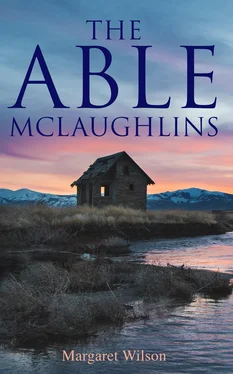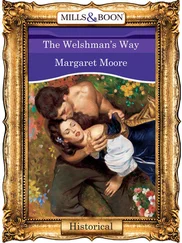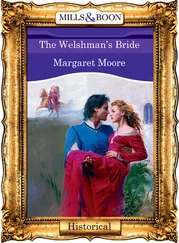Margaret Wilson - The Able McLaughlins
Здесь есть возможность читать онлайн «Margaret Wilson - The Able McLaughlins» — ознакомительный отрывок электронной книги совершенно бесплатно, а после прочтения отрывка купить полную версию. В некоторых случаях можно слушать аудио, скачать через торрент в формате fb2 и присутствует краткое содержание. Жанр: unrecognised, на английском языке. Описание произведения, (предисловие) а так же отзывы посетителей доступны на портале библиотеки ЛибКат.
- Название:The Able McLaughlins
- Автор:
- Жанр:
- Год:неизвестен
- ISBN:нет данных
- Рейтинг книги:5 / 5. Голосов: 1
-
Избранное:Добавить в избранное
- Отзывы:
-
Ваша оценка:
- 100
- 1
- 2
- 3
- 4
- 5
The Able McLaughlins: краткое содержание, описание и аннотация
Предлагаем к чтению аннотацию, описание, краткое содержание или предисловие (зависит от того, что написал сам автор книги «The Able McLaughlins»). Если вы не нашли необходимую информацию о книге — напишите в комментариях, мы постараемся отыскать её.
The Able McLaughlins — читать онлайн ознакомительный отрывок
Ниже представлен текст книги, разбитый по страницам. Система сохранения места последней прочитанной страницы, позволяет с удобством читать онлайн бесплатно книгу «The Able McLaughlins», без необходимости каждый раз заново искать на чём Вы остановились. Поставьте закладку, и сможете в любой момент перейти на страницу, на которой закончили чтение.
Интервал:
Закладка:
“Wully is to have the kitchen bed by himself. You all just go upstairs and leave him alone.”
The stranger had the decency to go soon to his bed. It wasn’t a half-bad bed, either. And he was tired. It had been a sudden impulse, this driving the soldier home, with a new team, over no road at all. But he was glad he had come. He had wanted to see this country. The new horses had jogged along very well. Moreover, he had made friends among the Scotch, and he was a politician. He thought of his son with Sherman’s army. He thought of the soldier’s impressive mother. He smiled over the number of children. He slept.
But long after the house was quiet, Wully lay talking to his father and mother, who sat on his kitchen bed. He told them of marches and battles and fevers and skirmishes, none of which had endangered him at all, of course, of the comradeship among the boys from the Yankee settlement down the creek, and of the hope everywhere, now, that the end was near. Then gradually there fell a silence over them, an understanding silence, wherein each knew the other’s thoughts. They were all thinking of that first terrible home-coming of his, of the things that led up to it. He remembered how “the boys” had been eating breakfast in camp, when the orders came that meant their first battle. He had been in an agony of fear lest he might be afraid. The one good thing about it was that Allen, his brother, had been sent away on a detail not an hour before. He would go into battle without having his brother to worry about. That trembling, as he advanced, had not been fear, but only ague so severe he might have stayed behind if he had chosen. But he had advanced with the rest of them, and in the darkness when he tried to sleep after it was over, he knew he need not fear cowardice again. They had won the day, and they exulted as fiercely as they had fought. Had not their regiment been one of three which, not getting their orders to retreat, had stood firmly till fresh troops came to save the day! But the next morning’s task had mocked terrifyingly their victory. He could have pleaded fever to escape from that. … Some on the snow-covered hillside were digging great trenches, some were throwing body after body into them, some were shoveling earth in upon them. He had bent down to tug at a stiff thing half hidden by snow, he had turned it over, a head grotesquely twisted backward, a neck mud-plastered, horrible, bloody. Then he had cried out, and fallen down. That thing, with the lower face shot away, was Allen! His comrades, hunting about, found the bodies of the others of the little squad that had been hurriedly recalled.
That night Wully had planned to desert. He had announced his intention to his lieutenant who came to sit beside him. They might drum him out of camp as a deserter if they would. He was telling them plainly what he intended doing. He would never fight again. But before he was able to walk, his comrades had got him a furlough. They understood only too well his fever and his delirium, and they remembered how he had gone through the battle, vomiting and ague-shaken, firing with a hand too weak to aim, and vomiting again, and shaking and firing. All the way home he had planned how to break the news to his mother. But when he had seen her, his grief which before had had no outlet, suddenly burst forth, so that even as she asked him, he was sobbing it all out to her. He had never told her, of course, how Allen’s sweet singing mouth had been destroyed. For Allen had been a gay lad, playing the fiddle, and singing many songs, sometimes little lovable ones he made as he sang, about pumpkins, or the old red rooster, or anything that might please the little children.
For Wully, no home-coming could ever again be so terrible as that one. But his father and mother who sat beside him there were trying not to know that just such news might come at any time of this one, who must go back to death’s place. Wully lay telling them little things he could recall of those last days. Had he told them of the time that the captain had stood, unbeknown to Allen, behind a bush, listening to him imitate all the company’s officers? There had never been a day that Allen had not been called upon to make fun for his comrades. Laughter had bubbled up within him and gushed out even in stark times. There was no detail of his nonsense not precious to the two who listened. It was late before they left him, and he soon slept. Towards morning, his mother slept.
Soon after daylight the stranger came into the kitchen. The mother was standing half hidden by the steam that rose from the milk pails that she was scalding out. The oldest sister at a table where candlelight and dawn struggled together, was packing a school lunch into a basket. A small girl was buttoning fat Sarah into her dress. Two small boys were struggling with their shoes on the floor. Wully presently hobbled in from out of doors, declaring himself recovered, a giant refreshed. The stranger noticed that when they found their places at the table, there was a larger child beside each smaller one, to look after him. There was one little fellow who looked like the soldier, and a half-grown sister with beautiful regular features like his. But the others were all alike, with deeply set dark blue eyes, long upper lips, and lower faces heavy, keen, determined. He could have appreciated what the mother said sometimes simply, to the neighbors, when they remarked how good her children were: “Yes, they’re never any care when they’re well. If we had one or two, we might let them have tantrums. But who could live in a house with thirteen ill bairns?” Since by that she meant, of course, naughty children, her question seemed indeed unanswerable.
Now they sat eating lustily their cornmeal, and she talked with leisure and understanding. When the meal was finished, Flora handed her father The Book again.
“By Golly!” said the stranger to himself, “they’re going to do it again!” And they did. The mother lifted the Psalm from memory, and then they repeated some part of the Bible. The stranger was the more ill at ease because young Hughie’s eyes were fixed accusingly upon him. Again the father prayed for all the inhabitants of the world, by name or class.
When the boys brought the guest’s wonderful team to the door, all the family gathered to bid him good-by.
“I wish you well, sir, for your kindness,” the father said, and the mother, at a loss to know how to thank him sufficiently, added,
“We’ll never forget this, neither us nor our children!” It was that trembling choked back in her voice that gave the stranger’s grandson his work with the firm of Andrew McLaughlin, in the fall of 1920.
The beautiful grays started impatiently away, the men went to their work, and the children to their school. In the kitchen his mother bandaged Wully’s feet, and put the wee’uns out of door to play while he had a sleep. At half past eleven he woke. His mother was sitting in the doorway, shelling beans. How was he to guess that she was late with her dinner preparations because again and again she had to stop, and look at this child of hers grown a strange man in the midst of horrors unimaginable? He lay very still looking at her. The kettle was singing on the stove. Through the door, he saw the red calf sleeping in the sunshine. A wave of joy, of ecstasy complete passed over him. Oh, the heaven of home, the peace of it, of a good bed, of a mother calmly getting dinner!
“I’m starved, mother!” he sang out suddenly to her. She hurried to the cellar, and brought him cool milk and two cookies. The children, hearing him, came in to watch him. He sat down in the doorway, and began throwing beans up, and catching them skillfully, to win the friendship of the doubtful little Sarah. David watched him eagerly. Presently Hughie said:
“Mother, why did yon strange man not say the Psalm?”
Читать дальшеИнтервал:
Закладка:
Похожие книги на «The Able McLaughlins»
Представляем Вашему вниманию похожие книги на «The Able McLaughlins» списком для выбора. Мы отобрали схожую по названию и смыслу литературу в надежде предоставить читателям больше вариантов отыскать новые, интересные, ещё непрочитанные произведения.
Обсуждение, отзывы о книге «The Able McLaughlins» и просто собственные мнения читателей. Оставьте ваши комментарии, напишите, что Вы думаете о произведении, его смысле или главных героях. Укажите что конкретно понравилось, а что нет, и почему Вы так считаете.












